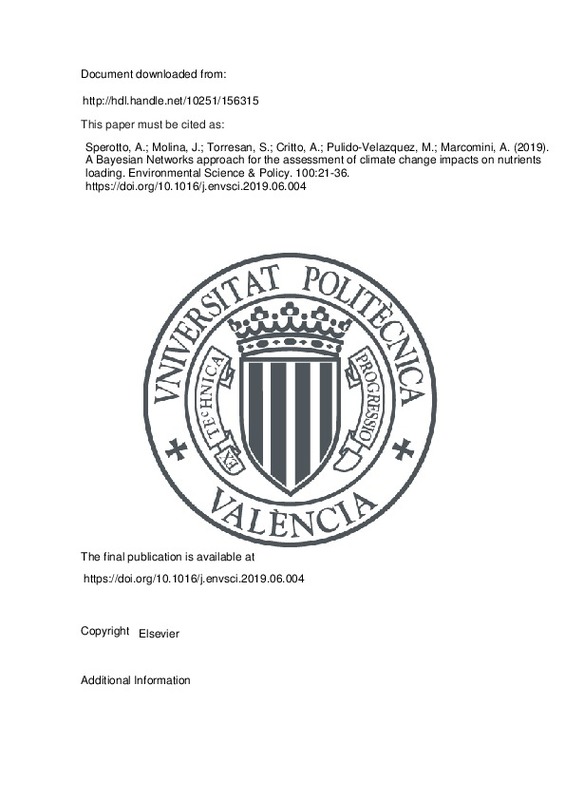JavaScript is disabled for your browser. Some features of this site may not work without it.
Buscar en RiuNet
Listar
Mi cuenta
Estadísticas
Ayuda RiuNet
Admin. UPV
A Bayesian Networks approach for the assessment of climate change impacts on nutrients loading
Mostrar el registro sencillo del ítem
Ficheros en el ítem
| dc.contributor.author | Sperotto, A.
|
es_ES |
| dc.contributor.author | Molina, J.L.
|
es_ES |
| dc.contributor.author | Torresan, S.
|
es_ES |
| dc.contributor.author | Critto, A.
|
es_ES |
| dc.contributor.author | Pulido-Velazquez, M.
|
es_ES |
| dc.contributor.author | Marcomini, A.
|
es_ES |
| dc.date.accessioned | 2020-12-03T04:31:24Z | |
| dc.date.available | 2020-12-03T04:31:24Z | |
| dc.date.issued | 2019-11 | es_ES |
| dc.identifier.issn | 1462-9011 | es_ES |
| dc.identifier.uri | http://hdl.handle.net/10251/156315 | |
| dc.description.abstract | [EN] Climate change is likely to strongly affect both the qualitative and quantitative characteristics of water resources. However, while potential impacts of climate change on water availability have been widely studied in the last decades, their implication for water quality have been just poorly explored since now. Accordingly, an integrated assessment based on Bayesian Networks (BNs) was implemented in the Zero river basin (Northern Italy) to capture interdependencies between future scenarios of climate change with water quality alterations (i.e. changes in nutrients loadings). Bayesian Networks were used as integrative tool for structuring and combining the information available in existing hydrological models, climate change projections, historical observations and expert opinion producing alternative risk scenarios to communicate the probability (and uncertainty) of changes in the amount nutrients (i.e. NO3-, NH4+, PO43-) delivered from the basin under different climate change projections (i.e. RCP 4.5 and 8.5) The model predictive accuracy and uncertainty were evaluated through a cross comparison with existing observed data and hydrological models' simulations (i.e. SWAT) available for the ease study and, in addition, sensitivity analysis was performed to identify key input variables, knowledge gaps in model structurers and data. Simulated scenarios show that seasonal changes in precipitation and temperature are likely to modify both the hydrology and nutrient loadings of the Zero river with a high probability of an increase of freshwater discharge, runoff and nutrient loadings in autumn and a decrease in spring and summer with respect to the current conditions 1983-2012. Greater increase for both river flow and nutrients loadings are predicted under the medium and long term RCP8.5 scenarios. Diffuse pollution sources play a key role in determining the amount of nutrients loaded: both NH4+ and PO43- loadings are mainly influenced by changes in hydrological variables (i.e. runoff) while NO3- loadings, despite being highly dependent on flow conditions, are also influenced by agronomic practices and land use (i.e. irrigation, fertilization). Highlighting key components and processes from a multi-disciplinary perspective, BN outputs could support water managers in tracking future trends of water quality and prioritizing stressors and pollution sources thus paving the way for the identification of targeted typologies of management and adaptation strategies to maintain good water quality status under climate change conditions. | es_ES |
| dc.description.sponsorship | The research leading to these results has received funding from the Euro-Mediterranean Center on Climate Change (CMCC), Strategic Projects Funds (2016-2018). The authors would like to thank all the public authorities and local experts that provided territorial data and information supporting the implementation of the methodology, especially the Regional Agency for Environmental Protection and Prevention (ARPAV) and the Venice Water Authority. We also thank Monia Santini (CMCC) for providing the COSMO-CLM projections and Marco Pesce (Ca Foscari University) for making available the hydrological simulations for the Zero river basin. Finally, authors are grateful to the two anonymous reviewers for the supportive and constructive comments which helped in improving the final version of the manuscript. | es_ES |
| dc.language | Inglés | es_ES |
| dc.publisher | Elsevier | es_ES |
| dc.relation.ispartof | Environmental Science & Policy | es_ES |
| dc.rights | Reconocimiento - No comercial - Sin obra derivada (by-nc-nd) | es_ES |
| dc.subject | Bayesian Networks | es_ES |
| dc.subject | Climate change impacts | es_ES |
| dc.subject | Nutrients loading | es_ES |
| dc.subject | Water quality | es_ES |
| dc.subject | Zero river basin | es_ES |
| dc.subject.classification | INGENIERIA HIDRAULICA | es_ES |
| dc.title | A Bayesian Networks approach for the assessment of climate change impacts on nutrients loading | es_ES |
| dc.type | Artículo | es_ES |
| dc.identifier.doi | 10.1016/j.envsci.2019.06.004 | es_ES |
| dc.rights.accessRights | Abierto | es_ES |
| dc.contributor.affiliation | Universitat Politècnica de València. Departamento de Ingeniería Hidráulica y Medio Ambiente - Departament d'Enginyeria Hidràulica i Medi Ambient | es_ES |
| dc.description.bibliographicCitation | Sperotto, A.; Molina, J.; Torresan, S.; Critto, A.; Pulido-Velazquez, M.; Marcomini, A. (2019). A Bayesian Networks approach for the assessment of climate change impacts on nutrients loading. Environmental Science & Policy. 100:21-36. https://doi.org/10.1016/j.envsci.2019.06.004 | es_ES |
| dc.description.accrualMethod | S | es_ES |
| dc.relation.publisherversion | https://doi.org/10.1016/j.envsci.2019.06.004 | es_ES |
| dc.description.upvformatpinicio | 21 | es_ES |
| dc.description.upvformatpfin | 36 | es_ES |
| dc.type.version | info:eu-repo/semantics/publishedVersion | es_ES |
| dc.description.volume | 100 | es_ES |
| dc.relation.pasarela | S\411956 | es_ES |
| dc.contributor.funder | Euro-Mediterranean Center on Climate Change | es_ES |
| dc.subject.ods | 06.- Garantizar la disponibilidad y la gestión sostenible del agua y el saneamiento para todos | es_ES |
| dc.subject.ods | 13.- Tomar medidas urgentes para combatir el cambio climático y sus efectos | es_ES |







![[Cerrado]](/themes/UPV/images/candado.png)

